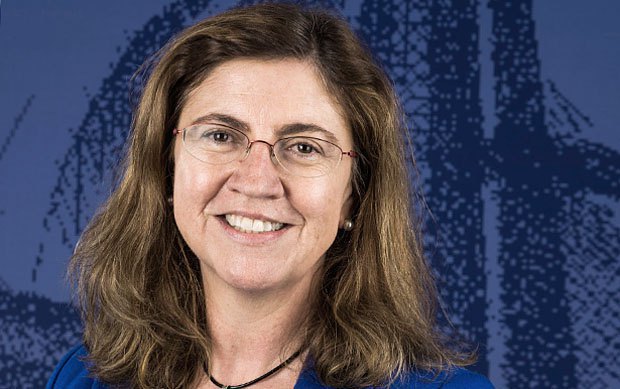
Brussels will hold the 28th NATO summit on 25 May. In March, NATO Secretary-General Jens Stoltenberg said that there would be two main issues on the agenda of the meeting of the heads of state at the end of May: the equal financial burden sharing, and the fight against terrorism. What other issues will there be on the agenda? Is Ukraine invited to participate in it?
When Allied leaders meet in Brussels on 25 May, the focus will be to discuss NATO’s continuing adaptation to the new security environment. This includes fair burden sharing, and NATO’s role in the fight against terrorism. The discussion on burden sharing will examine how far Allies have got to in implementing the Wales Defence pledge, and what more Allies can do to increase levels of defence spending, including on important capabilities, and to increase their contribution to NATO operations.
The discussion on the fight against terrorism will include what else we can do, particularly in building the capacity of local forces, so that our neighbors are more stable, which will be for the good of all of us.
The meeting will be a one-day gathering at Allied level only. We will also have a place at the table for our invitee Montenegro, which will soon be joining NATO after the ratification process is completed. Ukraine is a valued partner and we are grateful for Ukraine’s contributions to our operations and missions. We will continue offering strong political and practical support to Ukraine, as set out most recently when we met at the level of foreign ministers at the end of March.
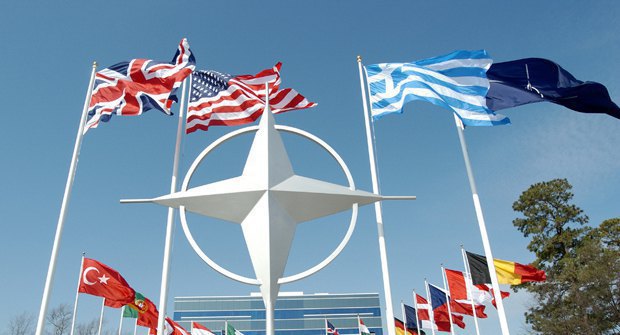
This July Ukraine marks the 20th anniversary of the signing of the NATO-Ukraine Charter; the founding of the NATO-Ukraine Commission and the opening of Ukraine's mission at NATO. In the past years, public support for NATO membership in Ukraine has increased. However, it seems that Ukraine still lacks support on this from the side of the Alliance. What can Ukraine do to interest NATO more?
NATO’s relations with Ukraine go back more than two decades. Already in 1991, Ukraine became a member of the North Atlantic Cooperation Council and in 1994 of the Partnership for Peace. On 9 July 1997, NATO signed with Ukraine the Charter on a Distinctive Partnership that further deepened joint cooperation through the creation of the NATO-Ukraine Commission. We will be marking the 20th anniversary of this Charter in July by the visit of the North Atlantic Council that reaffirms NATO’s continued political and practical support to Ukraine.
Ukraine remains one of NATO’s most important partners. NATO opened its first Information office ever on May 1997 in Ukraine and now has a full-fledged diplomatic representation with over 50 staff living and working in Kyiv. Ukraine has participated as a Partner in all of NATO’s operations and missions to this date. After the illegal annexation of Crimea and the start of Russia’s aggression in the east of Ukraine, Ukraine also receives support from both NATO Advisory Team on the ground and six new Trust Funds – more than any other country – in order to strengthen its capacity to provide for its own security. Ukraine is the biggest beneficiary of the NATO Science for Peace and Security Programme. Building integrity, professional development, defence education, social adaptation, and implementation of UNSCR 1325 on Women, Peace and Security in its security and defence sectors are but a few of the many assistance programmes NATO offers to Ukraine in the framework of our cooperation.
All of these demonstrate that NATO and Ukraine have a long and deep cooperation and that is important.
For NATO, a sovereign, independent and stable Ukraine, firmly committed to democracy and the rule of law, is key to Euro-Atlantic security.
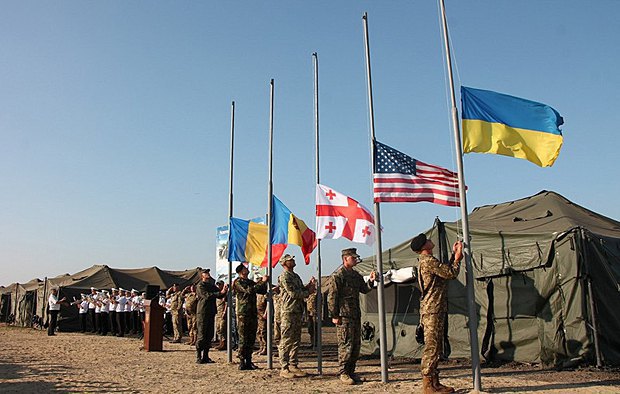
Ukraine has been making great efforts to meet NATO standards, at least on the technical level. How can you evaluate Ukraine's progress in reforming its armed forces?
Supporting reforms in Ukraine’s Armed and Defence Forces remains one of the top priorities of NATO’s practical support for Ukraine. In extremely difficult circumstances Ukraine has managed to make important progress on the path of reform.
Ukraine’s stated objective is to reform its security and defence sector according to NATO standards and principles and to achieve their interoperability with NATO forces by 2020. Assisting Ukraine in meeting this ambitious goal is one of the primary objectives of the Comprehensive Assistance Package adopted at the Warsaw Summit, which enhances and consolidates NATO’s assistance to Ukraine, using the wide range of instruments I outlined earlier.
To begin with, Ukraine has completed a comprehensive review of its security and defence sector. NATO advisers were engaged at every step of the process, from the development of the National Security Strategy in 2014 to the approval of the State Programme for the Development of the Armed Forces until 2020, a few weeks ago.
Our engagement with the Review included intensive joint work on the Strategic Defence Bulletin (SDB), which is Ukraine’s defence reform roadmap. More recently we have also been engaged in the development of a concept for the reform of the Security Service of Ukraine and a draft law on national security. Since the approval of the SDB before the NATO Summit in Warsaw, our advisers have been actively engaged in the work of the Defence Reform Committee (RC) at the Ministry of Defence. This key body is the focal point for SDB implementation, as well as the coordination of advisory and technical assistance provided by Allies in the implementation of the SDB’s strategic reform goals.
Much has been achieved in terms of designing and planning reform but the challenge of implementation remains ahead. Here I should underline that NATO standards are not only about technical standards, but also about upholding values and about inter-agency processes. All of this requires fundamental changes in mindsets, and in the way that institutions act and interact.
We fully realise the difficulty of carrying out reforms while fighting a conflict in the east. But we also believe that using the current window of opportunity to proceed with systemic reform of its security and defence sector will ultimately make Ukraine stronger and more resilient.
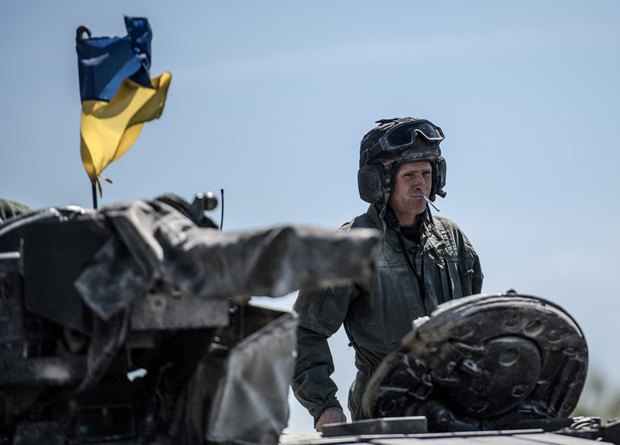
The president of Ukraine has recently approved the Annual National Programme (ANP) for 2017. How, in your opinion, was the ANP 2016 performed? Would you have any recommendations for the ANP 2017?
NATO and Ukraine regularly evaluate the achieved progress of Ukrainian reforms. Over the years, we have established several assessment tools and mechanisms to monitor achieved progress in the defence and security sector but also more widely the overall progress of a country. One such tool is the Annual National Programme.
On 25 April, Ukraine’s Deputy Prime Minister for European and Euro-Atlantic Integration Ivanna Klympush-Tsintsadze visited Brussels to discuss with Allied Ambassadors the progress made in Ukrainians reforms and to present the 2017 Annual National Programme.
It is difficult to overestimate the importance of the ANP as a key instrument to bring Ukraine closer to NATO. It offers Ukraine access to the combined experience and expertise of NATO and its members, to help achieve progress in the implementation of reforms in line with Ukraine’s strategic goal of European and Euro-Atlantic integration.
We believe that in the past this unique instrument has not been used to its full potential. This year, thanks mostly to the efforts of the Cabinet of Ministers and the Ministry of Foreign Affairs, the ANP has been revamped and become more strategic and goal-oriented, containing benchmarks for implementation of reform priorities in various areas of NATO-Ukraine cooperation. We hope that the new ANP will allow Ukraine to maximise the potential of this instrument, including through enhanced mechanisms of monitoring and coordination.
High-level political contacts remain frequent as well - such as the visit of Prime Minister Groysman to NATO on 7 February, the visit of the Deputy Secretary General to Kyiv on 6 April or the NUC sessions held in Brussels at the level of Foreign Ministers in December 2016 and 31 March 2017. All these meetings serve as an important platform for a frank and open discussion about the security situation in Ukraine and the status of its reforms, including the areas that need further improvement such as strengthening of democratic institutions and fight against corruption.
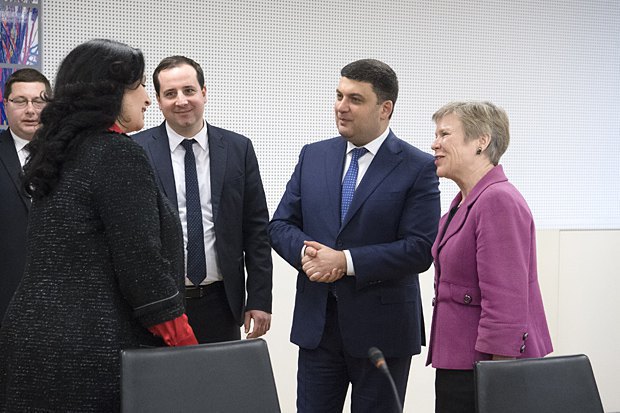
Reforms are a long process and Ukraine is working towards achieving its outlined goals even in the most difficult circumstances. Through its Representation to Ukraine, NATO provides valuable practical support to this complex process.
In an interview with one of the German newspapers, Petro Poroshenko said that he was ready to carry out a referendum on Ukraine's joining NATO. However, so far Kyiv has not even received a MAP with the strict criteria that the country must fulfil to join the Alliance. Besides, according to the Alliance's status, a country with the unresolved territorial conflicts and disputes cannot become the NATO member. Can the referendum influence in any way NATO's position on the possibility of Ukraine's membership?
It is up to each country to decide whether or not it wishes to join NATO and if it wishes to carry a referendum on membership.
The article 10 of the North Atlantic Treaty states that the Allies can, by unanimous agreement, invite a European country in position to further the principles of the Treaty and to contribute to the security of the North Atlantic area.
The Allies will respond to a request for NATO membership if presented to them by Ukraine as outlined in the treaty.
In the meantime, it is crucial for Ukraine to continue on the launched path of the ambitious reform agenda. NATO continues to stand by Ukraine by offering political and practical support and assist Ukraine with its reforms through a dedicated Comprehensive Assistance Package adopted at the Warsaw Summit.
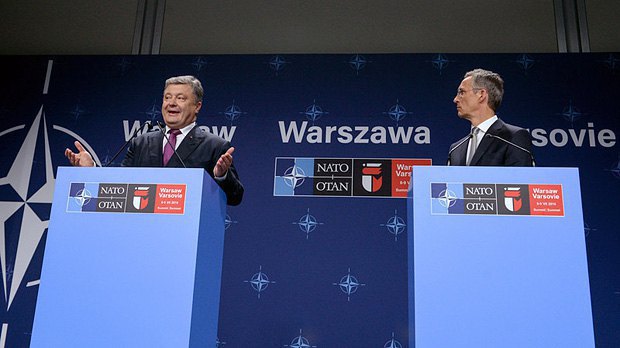
The NATO Information and Documentation Centre (NIDC) also celebrates its 20th anniversary this year. The Ukrainian media community and I personally, we feel the role of the NIDC in promoting the information on the NATO-Ukraine cooperation, but how would NATO evaluate its role and work?
In his opening speech of the NATO Information and Documentation Centre on 7 May 1997, the then NATO Secretary General Javier Solana stated the importance of nurturing good understanding of NATO in Ukraine and providing a platform for a frank exchange of views with Ukrainian citizens about NATO: "The purpose of this office is just what its name implies - to provide information on NATO affairs. Its aim is to satisfy a very great thirst in this country for information on the Alliance."
As the Deputy Assistant Secretary General for Public diplomacy, I feel very honoured to be here in Kyiv, 20 years later, to commemorate this important event and to witness how much we have accomplished together with our Ukrainian partners.
The role and mission of our office have not changed – information and facts are the most effective weapons against myths, disinformation and propaganda. Through frank and open dialogue, we achieve mutual understanding and respect.
The office has been here welcoming visitors and providing information during both the good and bad times of our relationship. It has been here during both the 2004 Orange Revolution and the 2013/2014 Revolution of Dignity. It is here today to support the implementation of the Concept on raising information awareness about Euro-Atlantic integrations and to support Ukrainian institutions in developing their own effective strategic communication.
These are great achievements and speaking on behalf the whole NATO Public Diplomacy Division, we are proud to celebrate our 20th anniversary of the NATO Information and Documentation Centre in Kyiv and looking forward to our next phase.
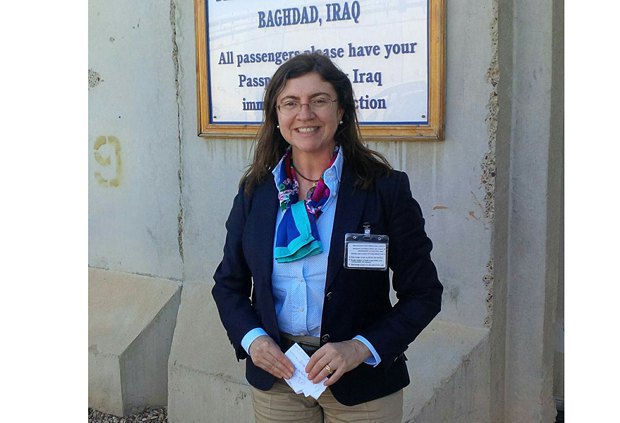
Carmen, you have a great experience in working as a journalist. You worked in Geneva, Moscow, and Paris, and have covered the revolution in Romania, the fall of the Berlin wall, the war in Chechnya, the crisis in Kosovo, the NATO campaign in former Yugoslavia. Since then, certain changes have occurred. I am talking primarily about the "improvement" of the hybrid warfare methods. Ukraine is now in the middle of the conflict, and everyone understands that it is a long-term one and has no military solution to it. In the meantime, Russia has achieved successes in carrying out the hybrid warfare. Ukraine, NATO and the EU are leading active campaigns against Russia's disinformation, but do you think that these efforts are sufficient?
We must be vigilant about disinformation. We don’t fight propaganda with propaganda but with facts. Together with our Allies and partners, such as the European Union, we provide factual information and actively fight disinformation. At NATO, we actively counter it on social media, and through engagement with the press and on our social media channels.
The media has a key role to play in countering disinformation and propaganda. It is important to ask the hard questions and always check facts and sources. This is a vital job. So we engage daily - online, on air, and in print, not just to counter incorrect reports, but primarily to explain NATO's decisions and actions.
We have for example a special website called "Setting the Record Straight", a one-stop shop for myth-busting factsheets, speeches, interviews, rebuttal statements, videos and photos published in several languages, including Russian and Ukrainian. All our efforts must be continued.








